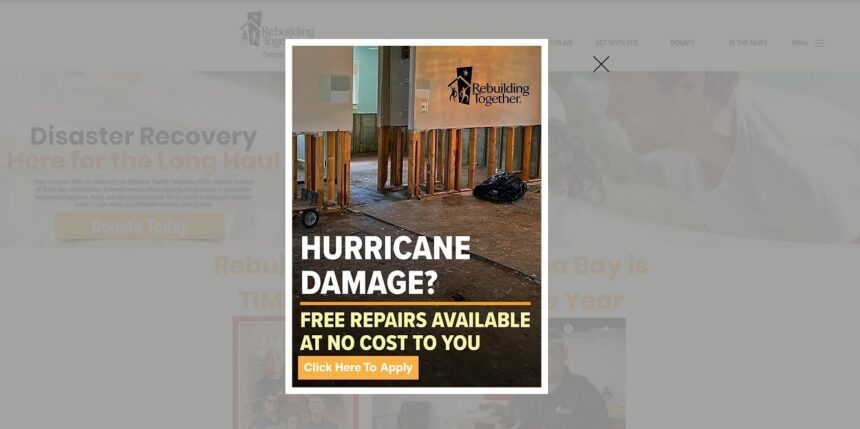In Tampa Bay’s challenging housing landscape, one organization has positioned itself as a lifeline for vulnerable homeowners. Rebuilding Together Tampa Bay (RTTB) promises free critical home repairs to low-income families, veterans, and those affected by natural disasters. But beneath this charitable veneer, a more complicated picture emerges—one of mixed reviews, uneven experiences, and potential scams exploiting the organization’s name.
The Mission and Services: What RTTB Claims to Offer
Founded over two decades ago, Rebuilding Together Tampa Bay operates as a 501(c)(3) nonprofit with a stated mission of “repairing homes, revitalizing communities, and rebuilding lives.” Their website showcases impressive statistics: $20 million invested in safe and healthy homes, 2,500+ homes repaired, and 10,000+ lives impacted.
The organization focuses on providing free critical home repairs to qualifying homeowners in multiple Florida regions, including Tampa Bay, Central Florida, North Florida, and Southwest Florida. Their services range from roof replacements after hurricane damage to accessibility modifications and healthy home improvements for families with respiratory issues.
To qualify for assistance, applicants must:
- Be residents of counties served by RTTB
- Live in and own their home
- Not own other residential properties
- Have household income at or below 120% Area Median Income
- Be current on taxes and mortgage payments
RTTB’s disaster recovery efforts have garnered recognition, including being named TIME Magazine’s 2024 Dreamer of the Year for their work helping rebuild communities after natural disasters.
Rebuilding Together Tampa Bay: Client Reviews and Complaints
Despite the positive press, a closer examination of RTTB’s public reputation reveals significant inconsistencies in client experiences.
The BBB Rating
The Better Business Bureau (BBB) gives RTTB a C+ rating, primarily due to their failure to respond to a detailed complaint filed in September 2024. Though the organization has been in business for 24 years, they are not BBB Accredited.
The complaint in question details numerous construction and quality issues, including:
- Incomplete work on a newly built home
- HVAC/electrical problems
- A septic system that was never properly connected
- Flooding problems related to improper culvert installation
- Various quality and workmanship concerns
Most concerning is RTTB’s failure to respond to this complaint, raising questions about their accountability practices.
Mixed Google Reviews
RTTB’s Google business profile shows a 4.3-star rating based on 30 reviews, but the experiences described are starkly divided:
Positive Experiences:
- Multiple families report improved health outcomes after asthma-related repairs
- Several homeowners praise specific staff members for their professionalism and care
- Successful hurricane recovery projects, particularly roof replacements
Negative Experiences:
- Unresponsive communication, with calls and emails going unanswered
- Promises made but not fulfilled
- Poor construction quality and incomplete projects
- Staff turnover affecting project continuity
One recent reviewer (from two weeks ago) described contacting RTTB for termite and leak issues causing mold in their home. After Hurricane Helene, they sought flood damage assistance and only received partial help with their AC. The reviewer mentioned organizational changes and staff turnover at RTTB, expressing concern about ongoing mold and termite damage.
The Veteran’s Experience
Perhaps the most detailed negative account comes from Geoffrey Black, a disabled veteran who appears to have documented his experience across multiple platforms. His complaints include:
- A septic system that was never electrically connected
- Doors and windows that didn’t lock properly
- Gouges in walls and bubbles in the ceiling
- Vent fans not connected
- HVAC installation problems
- Flooding issues
- Floor materials peeling up after only three months
Black’s experience suggests significant quality control issues within RTTB’s construction management processes.
Is Rebuilding Together Tampa Bay Legitimate Organization or a Construction Scam?
Based on available evidence, Rebuilding Together Tampa Bay appears to be a legitimate nonprofit organization with a genuine mission to help homeowners in need. They hold appropriate contractor licensing (CGC1522294) through Florida authorities, valid until 2026, and have demonstrated positive outcomes for many families.
However, the organization seems to suffer from serious operational issues:
- Quality Control Problems: Multiple reports of substandard construction work suggest insufficient oversight of contractors and workmanship.
- Communication Breakdowns: Consistent complaints about unresponsiveness indicate systemic issues in client communication.
- Project Management Failures: Several accounts describe abandoned projects or incomplete punch lists.
- Accountability Gaps: Failure to respond to formal complaints reflects poorly on organizational governance.
These issues don’t make RTTB a “scam” in the traditional sense, but they do suggest an organization failing to consistently deliver on its promises—particularly troubling given that they often serve vulnerable populations like disabled veterans, low-income families, and disaster victims.
Beware: Scammers Exploiting RTTB’s Name
While RTTB itself appears to be a legitimate organization with operational problems, scammers have been known to exploit the names of established nonprofits to target potential victims. This is particularly common following natural disasters when people are desperate for assistance.
Typical scam approaches include:
- Text messages claiming to be from RTTB offering immediate disaster assistance
- Emails requesting personal information to “pre-qualify” for repair services
- Phone calls soliciting donations for hurricane victims
- Social media messages offering expedited application processing for a fee
These scams prey on the confusion and desperation that follows disasters, using the legitimacy of organizations like RTTB as cover for fraud.
Red Flags: How to Identify Rebuilding Together Tampa Bay Related Scams
To protect yourself from scams exploiting RTTB’s name or similar organizations, watch for these warning signs:
Unsolicited Communications
Legitimate organizations typically don’t reach out through unsolicited texts or emails offering assistance. RTTB has an application process that homeowners must initiate.
Requests for Immediate Payment
RTTB explicitly states that their home repair services are free to qualifying homeowners. Any request for payment likely indicates a scam.
Pressure Tactics
Scammers often create artificial urgency, claiming “limited spots” or “time-sensitive” opportunities that require immediate action.
Suspicious Contact Information
Check the email address, phone number, or website carefully. Legitimate communications from RTTB would come from @rttb.org email addresses and direct to their official website.
Requests for Sensitive Information
Be wary of requests for sensitive personal information, especially via text, email, or social media. Legitimate applications go through official channels.
Protecting Yourself: What to Do About Suspicious Messages
If you receive a suspicious communication claiming to be from Rebuilding Together Tampa Bay:
- Don’t respond directly to the message, email, or call.
- Independently verify by contacting RTTB through their official website (rttb.org) or calling their published phone number (813-878-9000).
- Never click links in suspicious texts or emails—they may contain malware or lead to phishing sites.
- Report the scam to the Florida Attorney General’s Office and the Federal Trade Commission (FTC).
- Alert RTTB directly about the scam so they can warn others.
If You’ve Already Engaged With a Scammer
If you believe you’ve fallen victim to a scam exploiting RTTB’s name:
- Contact your financial institutions immediately if you shared payment information.
- Place a fraud alert on your credit reports through the major credit bureaus.
- Report the incident to local law enforcement and file a complaint with the FBI’s Internet Crime Complaint Center (IC3).
- Document everything, including copies of messages, emails, and records of any payments made.
- Monitor your accounts for suspicious activity for several months after the incident.
Making an Informed Decision About RTTB
For homeowners considering applying for assistance from Rebuilding Together Tampa Bay:
Do Your Research
- Review recent testimonials and experiences from other homeowners
- Check their current BBB rating and complaint history
- Understand exactly what services they’re offering and any obligations involved
Ask Critical Questions
- Who will be performing the actual construction work?
- What quality control measures are in place?
- How will communication be handled throughout the project?
- What recourse do you have if work is unsatisfactory?
Know Your Alternatives
- Research other nonprofit home repair organizations in your area
- Check with your county about local assistance programs
- Look into disaster-specific relief if recovering from a hurricane
Conclusion
Rebuilding Together Tampa Bay represents a common dilemma in the nonprofit sector—an organization with a worthy mission that appears to struggle with execution and accountability. Their impact has undoubtedly been positive for many families, particularly those with health issues exacerbated by poor housing conditions.
However, the serious complaints documented by some recipients, coupled with the organization’s apparent reluctance to address these issues transparently, raises important questions about nonprofit governance and accountability.
For vulnerable homeowners seeking assistance, the lesson is clear: even legitimate organizations require careful vetting, clear communication, and ongoing oversight to ensure they deliver on their promises. And in the aftermath of natural disasters, when both need and opportunism run high, extra vigilance is required to distinguish genuine help from exploitation.
By staying informed and alert, Tampa Bay residents can both access legitimate assistance when needed and protect themselves from those who would exploit their vulnerability for profit.









































